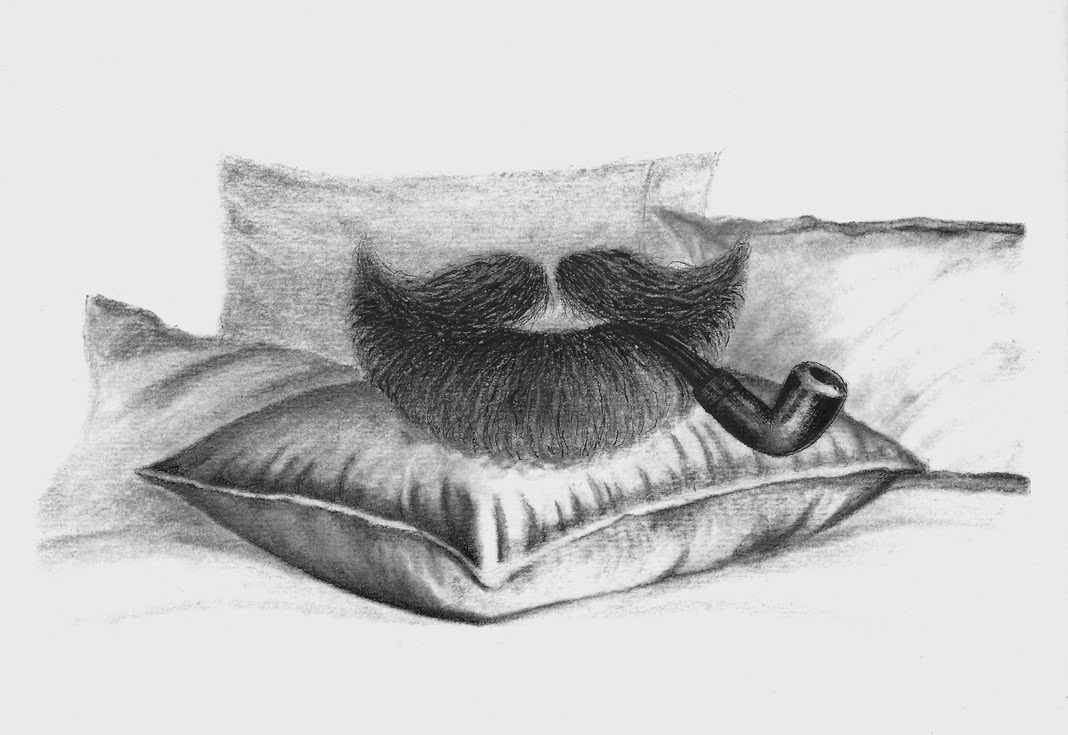1
In college, a professor said, thinking he might someday be a poet, “You ought to grow a beard.” When his girlfriend from Columbus, Ohio, visited him at school, his new beard rubbed the tender skin of her chin raw. She kissed him, then slapped him, and yelled, “Mammal!” Later, when his mother found beard hairs in the sink at home, she divorced his hairless father and moved into a trailer in the woods. Many wild men made visits there, dropping hints. In the meantime, his beard learned to read and roam without him, and picked up several women, all of whom wrote a novel before they left his beard. Further, he discovered that he is a character in several of his own beard’s writings, described variously as a chef, a tympanist, and a professional Irishman. Often in a strange city, he bumps into one of his beards. He introduces himself and buys it a drink.
2
The beard has a rich dream life. This is supported by the facts that Freud wore a beard, Marx wore a beard, Monet wore a beard. Great imagining arose in these men, thickly textured, full of violence, hysteria, light. Although “wore” is not the exact word: “grew” is closer to it, though that’s not the exact word, either. “Allowed”? If you used it that way in a sentence, it does not work: “Abraham Lincoln was a man who allowed a beard.” Not clear. But “a beard” itself is clear, evident, up front, so to speak. Except when it becomes, by choice or circumstance, suspect, an accomplice. If this were so, then the beard might well set traps, incite rebellions, foment intrigues. But when such claims are brought, we must recall Thomas More, martyr, who, in the moment before his execution under Henry VIII, carefully pulled his beard aside from the chopping block, explaining that it, at least, had committed no treason. Exactly.
3
One beard sowed such legends, tall tales, “stretchers,” that it became famous in places as far apart as Madagascar and Patagonia. In translation, stories about it spun wildly out of control, so that one morsel was reported
this way in Tupelo, Mississippi: “My grandmother Mildred Maude Foster once married a small copperhead, which she kept under her pillow, bringing it out only during the time of her other husband’s snoring. When he complained of bad dreams the next morning, she offered him a recipe for biscuits and gravy which he interpreted as the first nine verses of Genesis.” Those with beards who read this now may tug at them quizzically, but, after brief analysis, they will fully understand.
this way in Tupelo, Mississippi: “My grandmother Mildred Maude Foster once married a small copperhead, which she kept under her pillow, bringing it out only during the time of her other husband’s snoring. When he complained of bad dreams the next morning, she offered him a recipe for biscuits and gravy which he interpreted as the first nine verses of Genesis.” Those with beards who read this now may tug at them quizzically, but, after brief analysis, they will fully understand.
4
One particularly hardy beard survived a blizzard while traversing Montana in an open railroad gondola. Another wintered in Cuba, disguised as Che Guevara. It spoke in fragments of Spanish, its breath smelling of tobacco and limes. Houses lined themselves up in long avenues all around it, in which families slept in soft beds for centuries. Meanwhile, beautiful women kept passing it in the street without noticing, until it began to recite strange, brief poems about leaves and sand. Soon, it attracted great crowds stricken with hunger for fish. This became a problem the beard could not solve, until a barber with a large, coarse hair net arrived.
5
Unfortunately, the history of any beard goes on forever, even after the death of its wearer. The beard is made of sterner stuff. Some can withstand fire, others severe infections, still others the universal powers of decay. Some, like fingernails, can grow beyond death. There are vast mats of damp, red, Raskolnikovian beards under boreal forests in Siberia. There are pillows in some obscure tropical counties stuffed with beards. Hindu firewalkers think of beards to counter their pain. Triggerfish have been found with guts full of beard. Beards carry on, accumulating dust, bits of food, small twigs blown on the wind, even leaflets printed with lies by close-shaven politicians, or the sad prescriptions of rural doctors feeding an entire county’s addictions. Undertakers are careful to remove such evidence, though some keep vast, dangerous collections in beard-lined boxes which they open only for members of the family.
6
Insignificant facts about beards: They do not have memories. They are incapable of sorrow. Many are orphans or have been abandoned in dark inner city alleys. Some become priests. There has never been a bearded cosmonaut—at launch, that is. Some beards turn gray overnight. Some beards have known sin. A few beards have taken bribes from famous politicians, while others have paid off the cops. Some have been arrested. If spoken to for too long, or made to stand in line, or told lies continuously by smiling mayors, some beards will curse. Others will arm themselves and maintain surveillance. One beard, asked if it ever told the truth, replied, “When it is necessary and convenient—which is rarely. Otherwise, why bother?” Two beards walk into a bar. The bartender, holding the phone he’s just answered, asks, “Which of you is Harry?” “I am,” they explained.
Richard Hague’s work has appeared in Poetry, Smartish Pace, Appalachian Journal, Northern Appalachian Review, Asheville Poetry Review, Birmingham Poetry Review, Nowhere Magazine, Hiram Poetry Review, Nimrod, Mid-American Review, Ohio Magazine, and dozens of other journals and anthologies. He is author or editor of 20 volumes, the most recent being Riparian: Poetry, Short Prose, and Photographs Inspired by the Ohio River (Dos Madres Press, 2019) with Sherry Cook Stanforth, and the essay collection Earnest Occupations: Teaching, Writing, Gardening, and Other Local Work (Bottom Dog Press, 2018), listed as “Recommended” by the U.S. Review of Books. He continues as Artist-in-Residence at Thomas More University in northern Kentucky.

